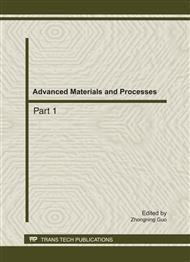p.576
p.583
p.587
p.591
p.596
p.600
p.609
p.615
p.619
Rheological Constitutive Model Depending upon Temperature and Strain Rate of Sheet TC1 Titanium Alloy
Abstract:
In order to achieve the numerical calculating rheological forming process of materials, a series of tension experiments under the different temperatures and different strain rates were done on the standard samples of sheet TC1 titanium alloy. The experimental results were analyzed theoretically and the rheological stress constitutive models of TC1 titanium alloy are built combining the strong points of the Perzyna model and Johnson-Cook model. Comparing the calculation results conducted from the model with the experimental results, it proves that the model can reflect the temperature effect and strain rate effect of TC1 titanium alloy.
Info:
Periodical:
Pages:
596-599
Citation:
Online since:
August 2011
Authors:
Price:
Сopyright:
© 2011 Trans Tech Publications Ltd. All Rights Reserved
Share:
Citation:


